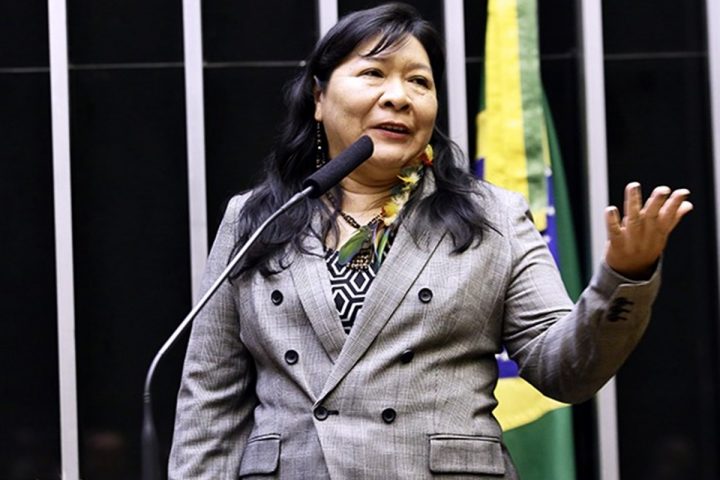Joênia Batista De Carvalho was born on April 20th,1974 in the village of Truaru Da Cabeceira, in the state or Roraima. When she was eight, she moved with her mother to the Capital Boa Vista. She enrolled to the Faculty of Law of the Federal University. Once she completed her studies in 1997, she moved to the United States on a scholarship and she specialized in International Law and Indigenous Politics in the university of Arizona. As a surname, she adopted the name that defines her ethnicity. Joênia Wapichana was the first indigenous woman to practice law in Brazil. She started working in CIR (Conselho Indigena De Roraima), Indigenous Council of Roraima, in defense of human rights of the ethnicity living in the State and in the South Region of Brazil.
In 2004 she received the Reebok Prize for the defense of the rights of these ethnic groups.
In 2008, in front of the Supreme Federal Court of Brasilia, she defended the continuous demarcation of the Indigenous Land Raposa-Serra do Sol. The court recognized that right, so she followed all the steps of that important trial which has become paradigmatic for the demarcation of other indigenous areas.
In 2010 has been co-awarded with the Order of Cultural Merit of the Ministry of Culture. In 2013 she was the first president of the newborn Commission of the indigenous people’s rights of OAB (Ordem dos Advogados Brazileiros), the Brazilian lawyers’ Association.
In March 2018 the 47th general Congress of the indigenous peoples of Roraima took place. The attendees thought it was important for their leaders to play political and institutional roles. The organized indigenous movement of Roraima identified in Joênia Wapichana the right person to apply for the Chamber of Deputies. In October the same year, she was elected the first federal deputy indigenous woman since the exit of Mario Juruna thirty-two years before, who had been the very first indigenous to be elected deputy. Joênia was elected in the first round with 8,491 votes for the REDE- sustainability network, for her involvement in topics like society, human rights, environmental preservation, sustainability; she also got many votes from non-indigenous populations.
On December 18th, ONU awarded her with the Human Rights Prize 2018.
On February 1st 2019 her mission started. On February 8, Joênia protocolled her first draft law which regarded as brutal those environmental crimes that seriously affect the environment and endanger life and human health.
On March 14th Brasilia’s OAB awarded her with the Mirtes Gomes Medal, which paid tribute to lawyers particularly active on the national legal front, especially in defense of women’s rights. Also in March, the Mixed Parliamentary Front in Defense of the Indigenous came to life, to whose creation Joênia contributed significantly. Among the victories already reported by the front is the return to the sender of the provision with which the current, wicked, president of Brazil wanted to entrust the demarcation of indigenous lands to the Ministry of Agriculture; ministry that is the lair of large landowners, traditional and ruthless enemies of the natives. Mario Juruna’s application was pursued and supported by Leonel Brizola and Darcy Ribeiro, two most famous Brazilians, but Juruna will not be elected again and for thirty-two years the natives have disappeared from the Brazilian parliament. It was the organised indigenous movement who elected Joênia Wapichana. She was the first indigenous woman to become federal deputy, but she would not stay alone for long; thanks also to the academic training which an increasing number of indigenous people has access to, their role has become unstoppable in all areas of the life of the Federative Republic of Brazil and of Brazilian society.
I would like to end my article on a personal note:
On January 2019 I was in Boa Vista. I expressed the desire to meet Joênia to the friend who hosted me, a generous and sensitive native of the Patamona ethnic group. Sooner said than done, touching me with her willingness and simpleness, it was Joênia herself who came and see me to our mutual friend’s place; she also invited us to have dinner with her. This anecdote speaks volumes about the humanity of Joênia, whom I wish to remain firmly tied to her indigenous bases/roots.
If she succeeds, then the success of her work is assured: not only will she be re elected, but her
example will inspire and encourage other intrepid Amazons to follow her on her path.
Translated from Italian by Silvia Nocera.










